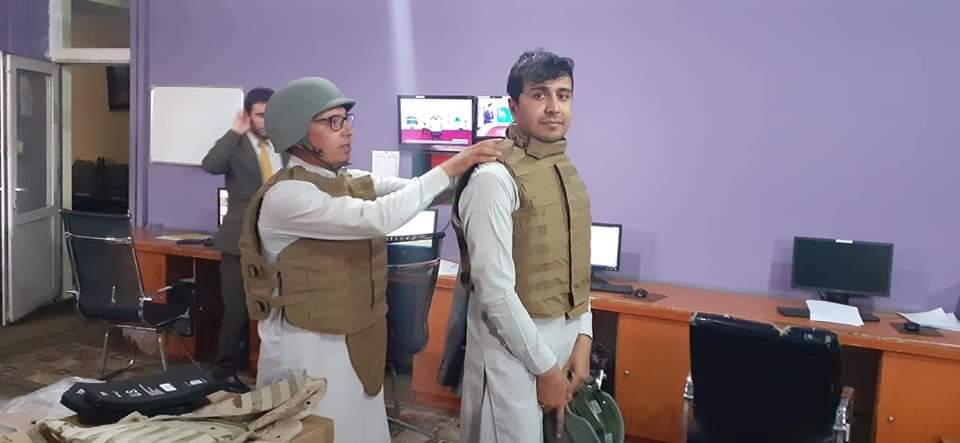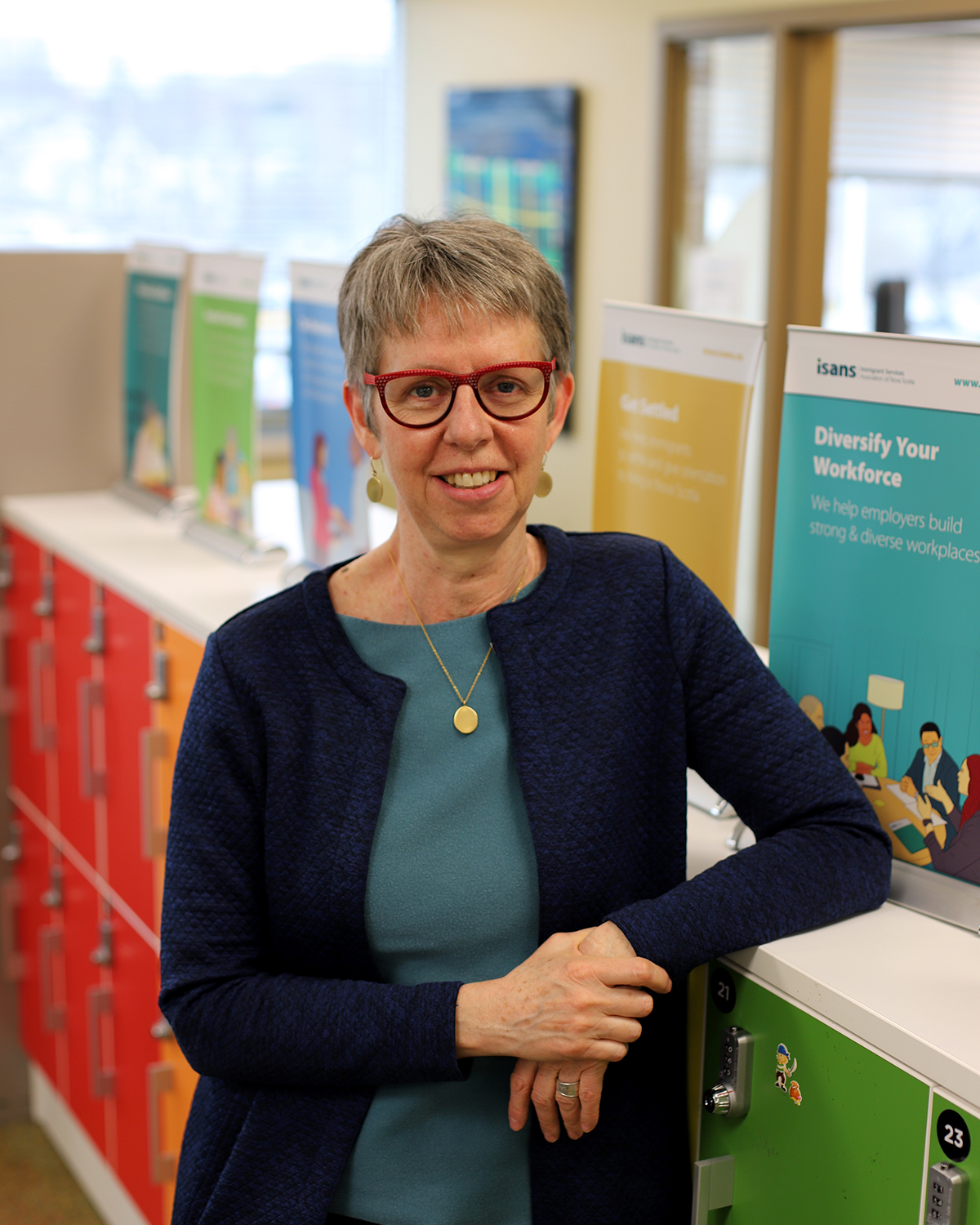An Afghan refugee and journalist who recently arrived in Halifax is glad to have a safe place to live, but he can’t stop thinking about his friends and colleagues suffering back in his home country.

Mahboob Elahi Mahzooz, 32, along with his wife and two children, arrived in Halifax earlier this month, along with about 100 other refugees fleeing violence and unrest in Afghanistan.

Mahzooz, who worked since 2018 as a foreign news journalist at a TV station covering NATO conferences in Kabul, said his work made him a target.
“Sometimes I was conducting exclusive interviews with foreign diplomats, ambassadors, based in Kabul,” he said in a recent interview with Global News.
“It was interesting, but full of risk.”
Even before the Taliban takeover in August, journalism in Afghanistan was a risky job.
While on assignment in 2019, Mahzooz went to an air base with a U.S. general to work on a story. It was his first time in a helicopter, and he took pictures and posted them on social media.
“After that, I received many threats: threats of being a helper of American forces, of NATO forces,” he said.
“I was frustrated but did not give up to such claims because all the claims regarding me were groundless and baseless.”
As his reporting continued to put him in danger, he said one of his sources he met through work helped him evacuate Afghanistan on Aug. 30 of this year, shortly after the fall of Kabul.

From there, he spent some time in Qatar, Germany and Kosovo before finally landing in Halifax earlier this month.

Get breaking National news
“It was a long journey, full of ups and downs,” he said.
‘They are suffering a lot’
Now, staying safely in a Halifax hotel with his family, Mahzooz is concerned for the lives of the journalists in Afghanistan — and everyone else who wasn’t lucky enough to escape.
“I’m safe, in one of the safest countries of the world, but things back at home makes me sad. Even sometimes, I drop tears,” he said.
“My colleagues who were working in the same department with me, my fellow journalists, they are suffering a lot. Some of them were arrested and tortured and were taken into custody for some time.”

As Global News has previously reported, the Taliban, seeking international aid and recognition, has been trying to show a friendly face to foreign reporters. Mahzooz said that hasn’t been the case for the Afghan journalists working on the ground.
He said many of his colleagues have lost their jobs and are struggling to survive during the country’s economic crisis.
“They are suffering the toughest situation ever of their lives, and they are in very dire conditions now,” he said.
According to the press freedom advocacy organization Reporters Without Borders, 40 per cent of Afghan media has closed down and more than 80 per cent of women journalists have lost their jobs since the Taliban takeover. About 50 per cent of male journalists also lost their jobs.
Even those who managed to keep their jobs face ongoing security issues. Mahzooz said some of his colleagues have been taken into custody and had their equipment broken while they were working.
As well, they are fearful to write or post online about their struggles due to fear of retaliation.
“Freedom of speech and the freedom of media is violated.” he said. “Media does not have freedom.”
With the threat of the Taliban no longer hanging over him, Mahzooz is speaking out to raise awareness about the conditions Afghan journalists are facing back home.
Before speaking with Global, Mahzooz said he reached out to some of his friends to let them know he had an interview.
“Believe me, they cried,” he said. “They cried and told me, ‘Mahboob, please raise our voice to get (us) evacuated.’”

He said he will continue to speak out on their behalf to try to get more Afghan journalists to safety.
In the meantime, Mahzooz and his family are settling into their new life in Canada. They are working on finishing their paperwork and finding a permanent home and employment.
“For the time being, Halifax is a good option for me, as well as for my family,” he said. “They like the place here, the sightseeing, the markets and stores. Totally, the entire environment.”
‘Heart-wrenching stories’
Jennifer Watts, the CEO of the Immigrant Services Association of Nova Scotia, the organization helping to settle the new refugees, said she recently had a chance to meet with Mahzooz and was touched by his story.
“It’s a very compelling story,” she said.
“Like many refugees from around the world — and certainly the particular situation that refugees coming out of Afghanistan have — it’s very difficult, heart-wrenching stories about needing to leave under very difficult conditions and leaving family and friends back behind.”
Watts said it’s common for the refugees the organization works with to feel sadness over what is continuing to happen in their home countries.
“Often, there’s nothing you can do and yet you know the situation that your family and friends are living in, and you’re hearing it on the news all the time, and it just creates a whole extra layer of stress as you’re trying to settle into a new country,” she said.
“You’re very thankful to be here, although knowing you have this opportunity where others don’t, to live in safety.”
This can have “quite a significant impact” on their mental health, she said, noting that ISANS has a number of supports available for refugees, including wellness and stress-reducing programs, employees who are trained in trauma-informed approaches, and initiatives to connect refugees to their new communities.
Watts said it’s important for people living in a safe country like Canada to listen to the stories of refugees — if they are comfortable enough to share them — to better understand their experiences.
“The stories that refugees bring us are very, very important, and it’s important for us to be prepared to take the time to listen to that,” she said.
“It does help us understand what responsibilities we have in the world to be supporting people who are living in difficult situations, but also to gain our own appreciation of many of the things we have here.”











Comments
Want to discuss? Please read our Commenting Policy first.